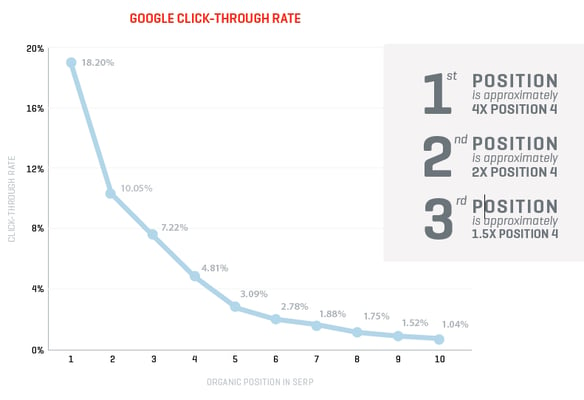Facing Google’s Wrath – How Your SEO Efforts can Backfire
 When it comes to search engines, Google is no doubt, king of the hill. A no. 1 search result for a keyword on Google can do wonders for your business. A survey conducted by Slingshot SEO found that searchers on Google click on the no. 1 ranked page 18.2% of the time, and clicked on any top 10 result 52.32% of the time. More than half the time, they’re clicking on that front page, so that’s where you want to be.
When it comes to search engines, Google is no doubt, king of the hill. A no. 1 search result for a keyword on Google can do wonders for your business. A survey conducted by Slingshot SEO found that searchers on Google click on the no. 1 ranked page 18.2% of the time, and clicked on any top 10 result 52.32% of the time. More than half the time, they’re clicking on that front page, so that’s where you want to be.

Credit: Slingshot SEO, "A Tale of Two Studies: Establishing Google & Bing Click-Through Rates"
If you’re turning to search engine optimization (SEO), you’re not alone. Research estimates that companies spend $14.6 billion in search engine marketing in North America alone. So it stands to reason that to win the search game, you should do anything to improve your rankings, right? Wrong. In 2011, J.C. Penney found itself at the wrath of Google after the search giant found an inordinate number of link-backs – more than 2,000 of them – to J.C. Penney’s site. These link-backs were often from irrelevant sites or sites without any real content to them. According to the New York Times, J.C. Penney had the no. 1 search term for words such as “dresses,” “bedding,” “area rugs” and “tablecloths” – things the store certainly sold, but should it be the no. 1 term for all of them? So what happened once Google discovered the link-backs? It manually intervened – a tough and infrequent punishment – and J.C. Penney suddenly fell from no. 1 for these terms to no. 71 or no. 68 and so on– huge, precipitous drops that could be incredibly detrimental to its business. To go from an estimated 18.2% click-through rate to a nearly infinitesimal fraction of 1% is huge.
Google’s rules for SEO
Google publishes webmaster guidelines to outline what’s fair and what’s not in SEO. In the last few years, Google has come out with new algorithms to catch online sites trying to “cheat” the system. For example, Google Panda, released last year, aimed to give higher search rankings to quality content rather than content from low-quality “content farms.” Google Penguin, released this year, aimed to catch web spammers. These are people that knowingly violate Google’s quality guidelines by keyword stuffing, participating in link schemes (links to spammers, excessive reciprocal links, buying or selling links), creating duplicate content, cloaking or creating sneaky redirects. In terms of advertising, an abundance of ads – especially those “above the fold” – will negatively affect your ratings. Google figures that people don’t like being overly sold to. And really, who could argue? In short, Google doesn’t like anything sneaky. It wants to provide relevant, quality content. So anything that aims to subvert that through deceptive means can land you in hot water. “But wait a minute,” you might be thinking. “If other companies are using some of these techniques to optimize results and aren’t getting caught, shouldn’t I be able to as well? Why is my quality content getting buried?” What Google would tell you is that these algorithms – while not always able to detect everything – are making it harder for companies to use these techniques. And if you are caught using them, it could spell major trouble for your company. So what’s the worst that could happen?
Automatic deranking, manual intervention or the death penalty
If Google’s algorithms catch you “cheating” on its rules, you’ll automatically go down in page rank. After the release of Panda, many “content farms” – pages created primarily to produce content for search engine ranking – saw their rankings dip, while “user-feedback” pages – pages users saw as valuable – rose in rankings. That meant a lot of social media sites rose in rank as well as news sites. If Google notices something with your website, or if there have been multiple transgressions, the company can manually intervene. Such was the case with J.C. Penney. In that case, the company’s link-backs were brought to Google’s attention; Google saw it as egregious so it manually intervened to change the rankings. The financial penalty to J.C. Penney is unknown. But with about $1.5 billion in online revenue, it was sure to have hurt somehow. And how about the ultimate penalty from Google? The company can give you the “death penalty” in which it completely removes your site from rankings. In 2006, Google did this to Germany’s BMW site after it found that it was using deceptive SEO methods.
Recovering your reputation – and your ranking
If you’ve been nabbed by Google, you can sometimes take action to restore your ranking. If Google’s algorithms take down your ranking, then tough luck. There’s nothing Google will do to change it – you will just have to work to improve your site. If Google manually intervenes or takes down your site, there is an appeals process and you can ask Google to reconsider. Overall, though, Google says the best course of action is to provide content that is optimized for site visitors, not for search engines. If you provide quality content, the users – and the rankings – will follow. And that’s going to make you money in the long run.




